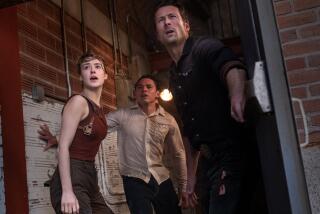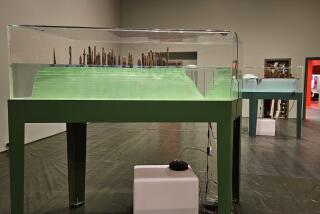How ‘Deepwater Horizon’ director Peter Berg and crew created what could be the biggest set ever built

Mark Wahlberg, Kurt Russell and Kate Hudson star in “Deepwater Horizon.”
To transport audiences onto a doomed oil rig, the makers of “Deepwater Horizon,” opening Sept. 30, decided to build what they believe is the biggest practical set ever constructed. The production, telling the story of the 2010 explosion and spill that killed 11 people in the Gulf of Mexico, took over a parking lot at an abandoned Six Flags amusement park in Louisiana, where about 300 people worked for seven months on the 85%-scale rig. According to production designer Chris Seagers, the set reached heights of 75 feet and was 150 feet wide and 170 feet long -- all sitting in a tank holding millions of gallons of water.
“On the drill deck, all the mechanics above them, we built that for real,” said Seagers. “We thought we’d just rent that stuff, but then you realize each piece weighs 20, 30 tons. So we had to make it all” to look real but be much lighter. “Even the pipes weighed tons,” he said. But things never go quite as planned. “When you made lightweight versions, in these Louisiana storms, they’d blow around, so you had to go back and make them heavy again to make it react correctly.”
Here, Seagers, along with director Peter Berg and special effects supervisor Burt Dalton, walk us through the making of the “Deepwater Horizon” set:
Building the perfect beast
Seagers: “Working on the coast of Louisiana gives you certain challenges, especially when you’re working with metal. Every day we were shut down because of lightning. We had to have these big, industrial lightning conductors attached to the set so at least we could control it if we were struck.”
Dalton: “The first time we took Pete out to the location, the legs of the tower were just going up. He said, ‘Oh my God, are you guys serious?’ We said, ‘You’ve got a chance to say no now.’ ”
Berg: “It was akin to any legitimate construction project, whether it’s a hotel or a hospital or an apartment building. I’m pretty sure it’s the biggest practical set ever built, really ever, in the history of filmmaking. It’s certainly one of them.”
Go big
I’m pretty sure it’s the biggest practical set ever built, really ever, in the history of filmmaking. It’s certainly one of them.
— Peter Berg
Berg: “It was an overwhelmingly massive experience to get on that rig. We were in this parking lot next to these roller coasters and we were [so much] bigger than they were. You know that feeling you get on a roller coaster, when you’re at the apex about to go down? It was like that every time you stepped up on our rig.”
Seagers: “We don’t normally build to that height because, technically, you don’t need to anymore because of visual effects. But we were working from the top down – normally you’re looking from the ground up.”
Dalton: “They came to the conclusion they couldn’t shoot everything that high up. Just walking to the set up the stairs and down, you were done. So we spent another month or so dividing that set up.”
The world’s largest virtual fireplace
Dalton: For such a massive fire, “rather than create these flicker effects, they have these 30-foot-by-30-foot LED screens. They flew that up on the deck. Visual effects needed all the light effects and shadow effects that would have been impossible to add in post. They took footage [of a fire] and blew it up so it would give the exact color and flicker of a real giant flame.”
Drill, baby, drill
Seagers: “Pete wanted to get the physicality of what these guys do, and just the scale of the thing. He wanted the drill pipe to really, physically go into the deck. We only built the drill deck 10 feet off the ground. The pipes come in 30-foot lengths – in order to get it to go down, we had to dig a hole beneath the set 30 feet deep.
“The real drill tower is 300 feet tall; we built 40 feet of it, then the visual effects guys took over. The way they picked up from the physical to the virtual is pretty seamless. It’s pretty amazing.”
Water, water everywhere
Berg: “There was a massive water tank that we would set on fire. We would engulf that rig in fire and send a crew up there.”
Seagers: Safety was, of course, top priority, but “Pete wanted to get it very real. To make it real for the actors, there had to be an element of – I don’t want to say danger, but trepidation.”
Berg: “There were things we could do practically we’d never be able to do [otherwise] in terms of explosions and fire and big, wide tracking shots that put our actors in the middle of something that felt very real.”
Dalton: Actual oil workers worked on the film. “The roughnecks were saying, ‘How’d you find the rig?’ Millions of gallons of water — we could make waves and run the boats for real -- and tens and tens of thousands of gallons of drillers’ mud – which we had to pick up every night. It was just a large-scale project.”
Movie Trailers
ALSO:
Clint Eastwood and Tom Hanks talk ‘Sully,’ heroism and politics
Boxer Vinny Paz’s tale of perseverance hits home for ‘Bleed for This’ director
‘Snowden,’ ‘Denial,’ and ‘Deepwater Horizon’ among this year’s newsy films at TIFF
More to Read
Only good movies
Get the Indie Focus newsletter, Mark Olsen's weekly guide to the world of cinema.
You may occasionally receive promotional content from the Los Angeles Times.






